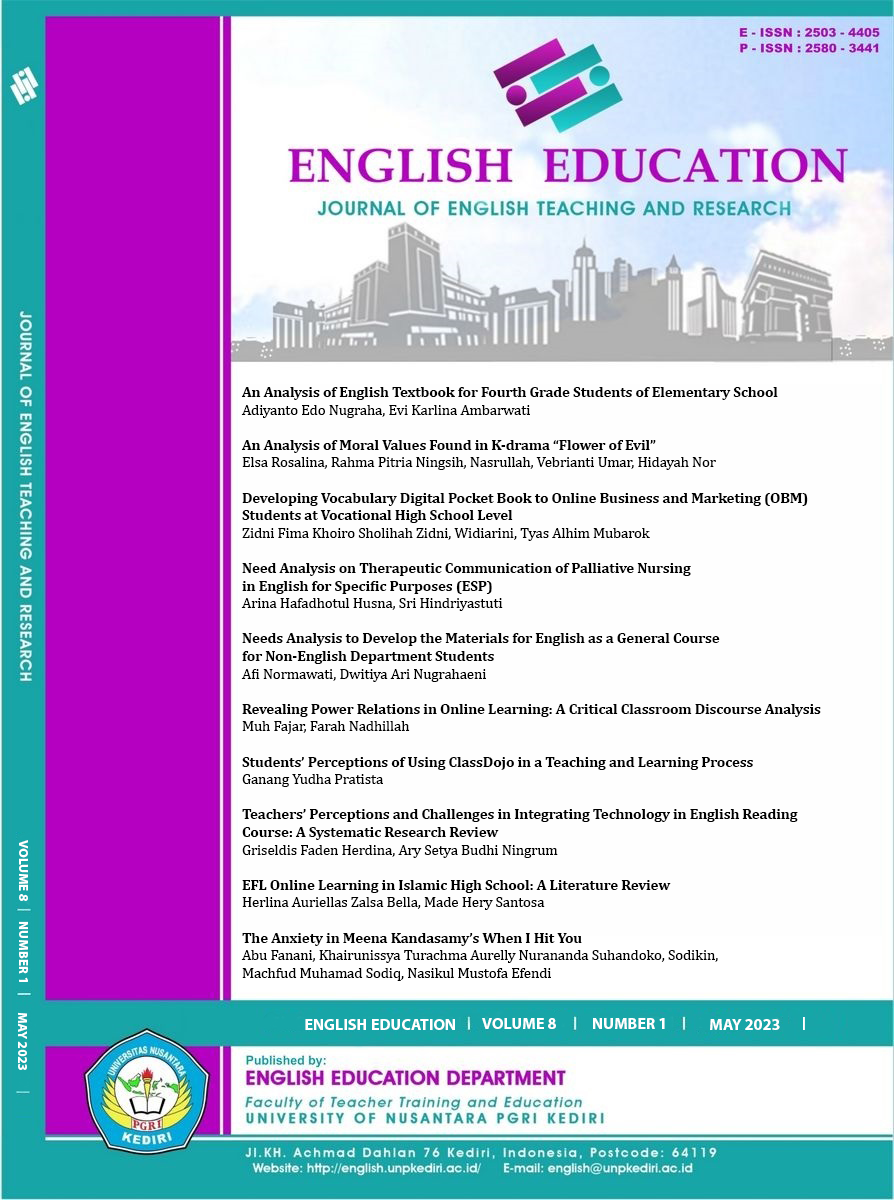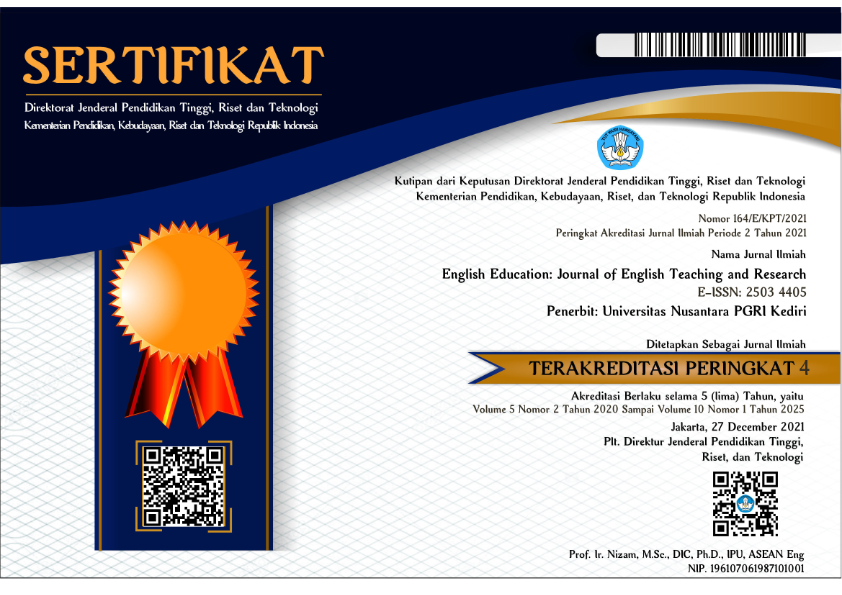Needs Analysis to Develop the Materials for English as a General Course for Non-English Department Students
DOI:
https://doi.org/10.29407/jetar.v8i1.19537Keywords:
needs analysis, materials development, English as a general course, General EnglishAbstract
Developing appropriate resources for a language learning programme, including those for English as a general course, is pivotal in order for the students’ learning to be successful. Prior to the development, the students’ needs should be assessed so that the materials developer obtains a comprehensive view of what the students need. This study aims to investigate the students’ needs to develop the materials for English as a general course for non-English Department students. The research was conducted at Universitas Tidar and involved 240 students from different departments. Quantitative research was employed as the approach of the study, and the data were collected by using a questionnaire. The findings show that the students are motivated to learn English for their potential careers in the future and for global communication. In addition, the students claim that they need to master listening, speaking, reading, and writing skill, as well as grammar and pronunciation. Further, the students consider listening as the most difficult macro skill to master and grammar as the most challenging language aspect to learn. Meanwhile, in relation to the topics, English for everyday, academic, and professional purpose are among the points that should be covered in the materials. In regard to the activity design, in-class activities that the students are most enthusiastic about are practicing pronunciation, learning vocabulary, and watching English-language videos; meanwhile, the students prefer to create videos and work on a project as their assignment. Moreover, they feel enthusiastic when working in groups rather than working in pairs and individually.
Downloads
References
Aliki, K., Makrina-Nina, Z., & Panagiota, D. (2021). A Needs Analysis Questionnaire: Designing and Evaluation. Journal of English Literature and Language, 1–9. https://doi.org/10.31829/2767-2964/jell2021-2(1)-107
Belcher, D., & Lukkarila, L. (2011). Identity in the ESP context: Putting the learner front and center in needs analysis. New Directions in English for Specific Purposes Research, 73–93.
Brown, D. (2001). The elements of language curriculum: A systematic approach to program development. Pergamon Press.
Darsih, E. (2018). LEARNER-CENTERED TEACHING: WHAT MAKES IT EFFECTIVE. Indonesian EFL Journal, 4(1), 33. https://doi.org/10.25134/ieflj.v4i1.796
Hutchinson, T., & Waters, A. (1987). English for Specific Purposes. Cambridge University Press. https://doi.org/10.1017/CBO9780511733031
Liu, J.-Y., Chang, Y.-J., Yang, F.-Y., & Sun, Y.-C. (2011). Is what I need what I want? Reconceptualising college students’ needs in English courses for general and specific/academic purposes. Journal of English for Academic Purposes, 10(4), 271–280. https://doi.org/10.1016/j.jeap.2011.09.002
Luo, Y. (2018). Discussion of General English and Academic English in College English Teaching. Proceedings of the 2018 4th International Conference on Education Technology, Management and Humanities Science (ETMHS 2018). https://doi.org/10.2991/etmhs-18.2018.30
Moiinvaziri, M. (2014). Students’ Voice: A Needs Analysis of University General English Course in Iran. GEMA Online Journal of Language Studies, 14(01), 57–75. https://doi.org/10.17576/GEMA-2014-1401-05
Nunan, D. (1988). Syllabus Design. Oxford University Press.
Nunan, D., & Lamb, C. (1996). The self-directed teacher: Managing the learning process. Cambridge University Press.
Seedhouse, P. (1995). Needs analysis and the General English classroom. ELT Journal, 49(1), 59–65. https://doi.org/10.1093/elt/49.1.59
Wulanjani, A. N. (2018). Exploring Students’ Need for Developing Material of English for Civil Engineering. Metathesis: Journal of English Language, Literature, and Teaching, 2(1), 1. https://doi.org/10.31002/metathesis.v2i1.552
Downloads
Published
Issue
Section
License
Authors who publish with this journal agree to the following terms:
- Copyright on any article is retained by the author(s).
- The author grants the journal, the right of first publication with the work simultaneously licensed under a Creative Commons Attribution License that allows others to share the work with an acknowledgment of the work’s authorship and initial publication in this journal.
- Authors are able to enter into separate, additional contractual arrangements for the non-exclusive distribution of the journal’s published version of the work (e.g., post it to an institutional repository or publish it in a book), with an acknowledgment of its initial publication in this journal.
- Authors are permitted and encouraged to post their work online (e.g., in institutional repositories or on their website) prior to and during the submission process, as it can lead to productive exchanges, as well as earlier and greater citation of published work.
- The article and any associated published material is distributed under the Creative Commons Attribution-ShareAlike 4.0 International License








 Article template
Article template



